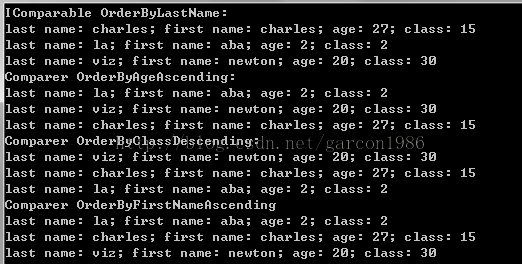CSharp - Comparison between IComparer and IComparable
/*
Author: Jiangong SUN
*/
I've already written an article introducing the usage of comparer here. In this article I'll compare the usage of IComparable and IComparer with examples.
Important difference: A class can have only one Comparable, but multiple Comparer.
Here I have a class Student with different properties, which will be used as sorting criterias.
public class Student : IComparable<Student>
{
public string LastName { get; set; }
public string FirstName { get; set; }
public int Age { get; set; }
public int Class { get; set; }
}
Firstly, I want class Student to implement interface IComparable, and I must override method CompareTo of interface IComparable. In this method I sort Student list in an ascending order.
//class who implement interface IComparable, must implement CompareTo method
public class Student : IComparable<Student>
{
public string LastName { get; set; }
public string FirstName { get; set; }
public int Age { get; set; }
public int Class { get; set; }
//CompareTo method compare itself to another object
public int CompareTo(Student student)
{
return LastName.CompareTo(student.LastName);
}
}
In this way, Student list will be sorted by LastName in an ascending order.
Next, I'll create 3 comparers who will use the rest 3 properties as sorting criteria.
//Comparer 1
//class who implement interfce IComparer, must implement Compare method
public class OrderByAgeAscending : IComparer<Student>
{
//Compare method compares two objects
public int Compare(Student x, Student y)
{
if (x.Age.CompareTo(y.Age) < 0)
{
return -1;
}
if (x.Age.CompareTo(y.Age) == 0)
{
return 0;
}
return 1;
}
}
//Comparer 2
public class OrderByClassDescending : IComparer<Student>
{
public int Compare(Student x, Student y)
{
if (x.Class.CompareTo(y.Class) < 0)
{
return 1;
}
if (x.Class.CompareTo(y.Class) == 0)
{
return 0;
}
return -1;
}
}
//Comparer 3
public class OrderByFirstNameAscending : IComparer<Student>
{
public int Compare(Student x, Student y)
{
if (x.FirstName.CompareTo(y.FirstName) < 0)
{
return -1;
} if (x.FirstName.CompareTo(y.FirstName) == 0)
{
return 0;
}
return 1;
}
}
Now I will create a new Student list with some Students and try to sort them with comparable and comparer.
Firstly, I will create a list.
var s1 = new Student() { LastName = "charles", FirstName = "charles", Age = 27, Class = 15 };
var s2 = new Student() { LastName = "viz", FirstName = "newton", Age = 20, Class = 30 };
var s3 = new Student() { LastName = "la", FirstName = "aba", Age = 2, Class = 2 };
var students = new List<Student>() { s1, s2, s3 };
Then, I will sort the list with comparable. I just need to call Sort() method, it will use the CompareTo() method I've created.
//IComparable: sort by last name
students.Sort();
Display(students, "IComparable OrderByLastName:");
And then, I will use the 3 comparers to sort the list.
//Comparer 1: order by age
var c1 = new OrderByAgeAscending();
students.Sort(c1);
Display(students, "Comparer OrderByAgeAscending:");
//Comparer 2: order by class
var c2 = new OrderByClassDescending();
students.Sort(c2);
Display(students, "Comparer OrderByClassDescending:");
//Comparer 3: order by first name
var c3 = new OrderByFirstNameAscending();
students.Sort(c3);
Display(students, "Comparer OrderByFirstNameAscending");
And there are an Display() method who is in charge of display the student information.
public static void Display(List<Student> students, string comparerName)
{
Console.WriteLine(comparerName);
foreach (var student in students)
{
Console.WriteLine("last name: " + student.LastName + "; first name: " + student.FirstName + "; age: " + student.Age + "; class: " + student.Class);
}
}
Now, let's see the results:

Right now, we are arrived at the end of the article. I hope you can find useful information here. Enjoy coding!
references:
http://addinit.com/node/50
http://www.codeproject.com/Articles/42839/Sorting-Lists-using-IComparable-and-IComparer-Inte